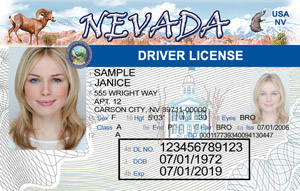- Updated for March 2025
- Based on official Nevada Driver's manual
Free Nevada DMV Permit Practice Test Three 2025
If you’re new to driving on the 95, you’d better understand the rules of the road to stay safe and follow its twists and turns. If you’re interested in getting a Nevada learner’s permit, the Spaghetti Bowl is not the place to get behind the wheel of a vehicle for the first time. However, by devoting some study time, you will be equipped with the knowledge of traffic laws and safe driving practices to handle complex driving situations like a pro.
While you may be excited to start driving, are you ready to meet the multiple requirements for obtaining a learner’s permit, including passing the official DMV knowledge test? This free Nevada DMV Permit Practice Test can serve as your road map to becoming a skilled driver. These permit practice tests contain everything you’ll need to know to pass the official knowledge test. You must answer 80% of the 25 questions correctly on the official knowledge test to earn a passing score. This practice test is stress-free and allows you to learn at your own pace. It presents a simulated testing environment and uses questions just like those on the official knowledge test to best prepare you.
The Permit Practice Test is the most comprehensive and reliable resource to advance toward becoming an exceptional driver. It is based on the most recent Nevada DMV driver’s manual (Nevada DMV Handbook (NV Driver's Manual) 2025) and up to date as of March 2025. Unlike a study guide, the practice test can track your progress and fill your knowledge gaps. It includes 40 questions to give you a real-time assessment of your readiness and address your deficiencies. If you submit an incorrect answer, the practice test will provide a detailed explanation of the correct one. Providing this valuable information is something a study guide fails to offer. For optimal learning, you should get feedback on the questions you miss. A study guide merely helps you memorize the answers to the questions. Once you understand the reasoning behind the correct answer, you’ll be better prepared to pass the official knowledge test.
Instead of searching for Lady Luck on Fremont Street, you may want to look at the practice tests for other U.S. states and Washington D.C. at https://driving-tests.org/academy/drivers-license.
- Perfect for learner’s permit, driver’s license, and Senior Refresher Test
- Triple-checked for accuracy
What you need to know

What to expect on the actual NV DMV exam
questions
correct answers to pass
passing score
minimum age to apply
List of questions (classic view)
- When making a right turn, you should avoid _________ before starting the turn.
- If you are having vehicle trouble and need to stop, what is the first thing you should do?
- A lighted red arrow means
- When you encounter a truck traveling next to you in the same direction, keep as far as possible to the side to avoid
- The primary traveling aids for a blind person include
- In a typical passenger car, partial hydroplaning can begin at speeds as low as
- If a railroad grade crossing has no warning devices or only a crossbuck sign, you should
- If another vehicle is passing you on the left,
- What is the first rule of a safe and legal turn?
- Stopping on the pavement or shoulder is only allowed
- If there are no traffic signals, you must yield the right-of-way to pedestrians in
- When driving in icy conditions, it is recommended to _____ for better traction.
- You are driving in a roundabout. An emergency vehicle using a siren or flashing lights is approaching. What should you do?
- When you're changing lanes, all of the following are correct maneuvers EXCEPT
- If a tire suddenly goes flat while you're driving, you should
- On a two-lane road, you may pass another vehicle
- What does this sign mean?
- An __________ is the connection of a freeway to a road or another freeway by a series of ramps.
- If you plan to turn beyond an intersection, you should
- When you exit a high-speed, two-lane roadway, _________ if you have traffic following you.
- If a truck is trying to pass you, you can help the truck driver by
- When turning left from a one-way road onto another one-way road,
- What does this sign mean?
- When driving on a two-way road with no centerline markings, you must
- If you are changing lanes, preparing to pass another vehicle, or entering traffic, signal and check for passing traffic. First, use your mirrors. Then
- Warning signs are placed along the roadways to
- When approaching an intersection to make a right turn, you must stay _________ and make the turn close to the right curb.
- A pedestrian using a white cane or a white cane tipped with red is usually
- What does this sign mean?
- You must NOT pass on the right if the vehicle you are passing
- When entering an interstate highway from an acceleration lane, you must
- If you suddenly have no control of the steering wheel, you should
- If you approach an intersection at which the traffic lights are not working, you must first __________ before entering the intersection and then yield the right-of-way.
- A sign with black letters on an orange background is
- At night, when should you switch on your high-beam headlights?
- If there is another driver tailgating you, you should NOT
- You see a sign shaped like a pennant. What does this sign mean?
- The distance that your vehicle travels between the time that you notice a hazard and the time that you start to brake is known as
- Which of the following types of signs inform you of possible hazards ahead?
- If an emergency vehicle using a siren or flashing lights is approaching you from either direction, you must
More resources
- Alabama: Test 1 / Test 2
- Alaska: Test 1 / Test 2
- Arizona: Test 1 / Test 2
- Arkansas: Test 1 / Test 2
- California: Test 1 / Test 2
- Colorado: Test 1 / Test 2
- Connecticut: Test 1 / Test 2
- Delaware: Test 1 / Test 2
- District of Columbia: Test 1 / Test 2
- Florida: Test 1 / Test 2
- Georgia: Test 1 / Test 2
- Hawaii: Test 1 / Test 2
- Idaho: Test 1 / Test 2
- Illinois: Test 1 / Test 2
- Indiana: Test 1 / Test 2
- Iowa: Test 1 / Test 2
- Kansas: Test 1 / Test 2
- Kentucky: Test 1 / Test 2
- Louisiana: Test 1 / Test 2
- Maine: Test 1 / Test 2
- Maryland: Test 1 / Test 2
- Massachusetts: Test 1 / Test 2
- Michigan: Test 1 / Test 2
- Minnesota: Test 1 / Test 2
- Mississippi: Test 1 / Test 2
- Missouri: Test 1 / Test 2
- Montana: Test 1 / Test 2
- Nebraska: Test 1 / Test 2
- Nevada: Test 1 / Test 2
- New Hampshire: Test 1 / Test 2
- New Jersey: Test 1 / Test 2
- New Mexico: Test 1 / Test 2
- New York: Test 1 / Test 2
- North Carolina: Test 1 / Test 2
- North Dakota: Test 1 / Test 2
- Ohio: Test 1 / Test 2
- Oklahoma: Test 1 / Test 2
- Oregon: Test 1 / Test 2
- Pennsylvania: Test 1 / Test 2
- Rhode Island: Test 1 / Test 2
- South Carolina: Test 1 / Test 2
- South Dakota: Test 1 / Test 2
- Tennessee: Test 1 / Test 2
- Texas: Test 1 / Test 2
- Utah: Test 1 / Test 2
- Vermont: Test 1 / Test 2
- Virginia: Test 1 / Test 2
- Washington: Test 1 / Test 2
- West Virginia: Test 1 / Test 2
- Wisconsin: Test 1 / Test 2
- Wyoming: Test 1 / Test 2
Your go-to, trusted source
Experience the Driving-Tests differenceOur commitment to accuracy and quality in our practice tests
Explore our rigorous, multi-tiered verification process that ensures each question mirrors the official manual for unparalleled accuracy.

At Driving-Tests.org, we understand the importance of reliable and accurate practice tests to help you prepare for your DMV exam. That's why we've developed a meticulous process to create and continually update our practice questions, ensuring they reflect the most current driving laws and regulations.
Here's an inside look at how we maintain the highest quality in our practice tests.
Content Creation and Verification Process
- Alignment with Official Manuals:
Every question we develop is based on the most recent version of each state's official driving manual. Our team regularly monitors each state DMV's website for the latest updates to ensure our practice tests are always aligned with the most current information. - Community Feedback Integration:
We leverage feedback from our vast community of users to understand which topics are most frequently tested. This helps us focus on the areas that are most relevant and beneficial for your preparation. - Expert Content Creation:
Our in-house editor, Steven, who has extensive experience in driver education, crafts each question with precision. He conducts a thorough review of each question against the official manuals to ensure accuracy. - Rigorous Review Process:
Once Steven has finalized a set of questions, our team conducts a joint review session. This second level of scrutiny involves content accuracy, proofreading, and fact-checking to eliminate any errors. - User Feedback Mechanism:
After a question goes live on our site, we keep the lines of communication open. Each question features a feedback button, inviting users to report any issues or errors. This continuous feedback loop allows us to address and rectify any concerns promptly. - Responsive Updates:
In line with our commitment to accuracy, we quickly update our practice questions to reflect any changes in the DMV manuals. Additionally, we update the free electronic copy of the state's driver's license manuals on our site, typically within a few days after the DMV publishes them.
Our thorough quality control process ensures that you have access to practice tests that are as accurate and up-to-date as possible. We believe in the power of well-prepared drivers and are dedicated to providing you with the best study tools to help you succeed on your DMV exam.
Pass the First Time - Guaranteed
Before you view your test results, discover how you can pass faster with Premium:
Real Exam-Like Nevada Questions
Get 650+ questions seen on the real test
Money-Back Guarantee
If you don't pass, it costs you nothing
97% Premium Users Pass on Their First Try
Compare with the average US passing rate of 49%
